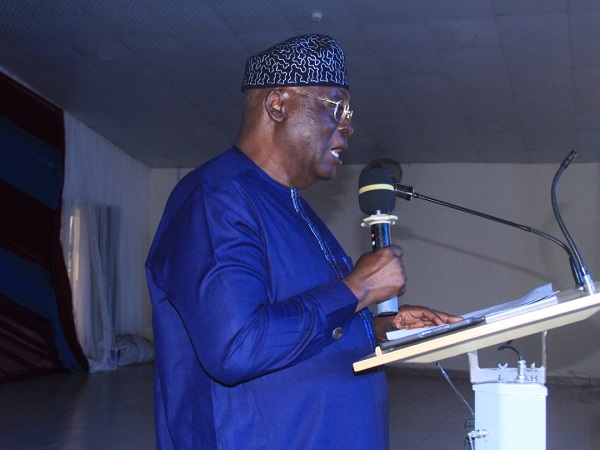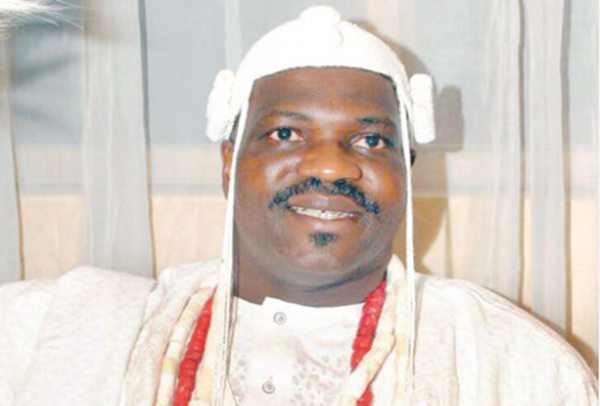
Chairman of the Board of the Nigerian Ports Authority (NPA), Senator Adedayo Adeyeye, has stressed the need for Nigeria to key into President Bola Ahmed Tinubu’s vision of the Blue Economy as a catalyst for unlocking the nation’s economic potentials.
Adeyeye made the call on Thursday while delivering a lecture at the maiden public lecture of the Centre for Blue Economy and Innovation of the Olusegun Agagu University of Science and Technology (OAUSTECH), Okitipupa, Ondo State.
He spoke on the theme: “Imperative of the Blue Economy in Driving Nigeria’s Economic Development.”
According to him, the Blue Economy presents “an opportunity that can transform Nigeria’s economy into an engine of prosperity through strategic investment, strong governance, and sustainable practices.”
He noted that the 21st century had opened new frontiers of economic growth, with the Blue Economy standing out as one of the most promising.
Describing it as the sustainable use of ocean and water resources for growth, job creation, and improved livelihoods while preserving aquatic ecosystems, Adeyeye said Nigeria was strategically positioned to benefit.
“Nigeria, with its over 853 km coastline, more than 200 nautical miles of exclusive economic zone, navigable inland waterways, and rich marine biodiversity, is uniquely placed to harness these resources. Yet, the sector remains largely underdeveloped,” he said.
Quoting the United Nations Development Programme (UNDP), Adeyeye observed that the global blue economy is valued at $2.3 trillion annually, sustaining the livelihoods of over three billion people worldwide.
“Nigeria cannot afford to miss her share of this wealth,” he added.
He cited Morocco as an example, noting that the country generates revenue from fisheries almost equivalent to Nigeria’s national budget and urged Nigeria to take maximum advantage of its marine resources.
The NPA chairman listed the key components of the Blue Economy to include: maritime transport, port services, fisheries and aquaculture, tourism and recreation, offshore renewable energy, seabed mining, marine biotechnology, shipbuilding and repair, coastal agriculture, and wetland resources.
“With our vast coastal lines, offshore wind, tidal, and wave energy currently wasting away, Nigeria can generate cheaper, environmentally friendly, and reliable power for domestic consumption and even export to West African neighbours, thereby earning robust foreign exchange,” Adeyeye stressed.
Remarking, Ondo State Deputy Governor, Dr Olayide Adelami, represented by the Deputy Chief of Staff, Adekola Falodun, urged stakeholders in the maritime sector to support the government in fully harnessing the Blue Economy initiative.
Similarly, OAUSTECH Vice-Chancellor, Prof. Temi Ologunorisa underscored the importance of shifting attention to ocean resources as land-based resources become increasingly depleted.
He disclosed that the university had already aligned with President Tinubu’s Renewed Hope Agenda through its School of Maritime Transport and Logistics, designed to produce skilled manpower for the emerging sector.
“If OAUSTECH is to play a leading role in the development of the Blue Economy in Nigeria, we must collaborate with captains of industry for idea exchange, partnerships, and shared experiences,” Ologunorisa said.
The VC further advised the Ondo State Government to domesticate Tinubu’s agenda by establishing a Ministry of Blue Economy and Marine Resources to drive the development of the state’s vast coastal lines.
Earlier, Director of OAUSTECH’s Centre for Blue Economy and Innovation, Prof. Funmilola Agbebi said the lecture was an opportunity to explore how Nigeria could balance economic growth, collaboration, social inclusion, and environmental sustainability in harnessing its blue resources.



